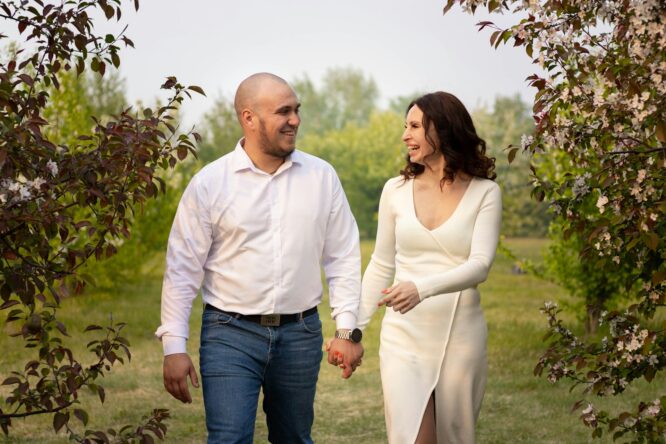When you’re close to someone, it’s tempting to think honesty means sharing everything that crosses your mind.

Of course, not all thoughts need airtime, especially if they’re fleeting, unhelpful, or just for your own processing. Saying less in the right moments doesn’t mean you’re hiding things from your other half. Instead, it’s all about having discretion, as well as knowing what builds connection, and what eats away at it for no good reason. If you know what’s good for your relationship, you’ll keep these things to yourself.
1. Every single time they annoy you

It’s normal to get irritated—no one’s partner is perfect. That being said, constantly pointing out every small thing that gets under your skin can create a low-level sense of walking on eggshells. If it’s something that truly impacts your relationship, sure, talk about it. However, if it’s just daily noise, letting some things slide protects your peace and theirs.
2. That you’re attracted to someone else

Finding other people attractive doesn’t mean you’re disloyal—it means you’re human. Of course, telling your partner about it, especially unprompted, often does more harm than good. Unless it’s part of a mutual, open conversation, that kind of comment usually just creates insecurity. If there’s no action or intention behind it, it’s probably better left unspoken. (The exception to this is obviously if you’ve had an affair or are considering it—you need to be upfront and honest about that immediately.)
3. The detailed play-by-play of every past relationship

Context can be helpful, but oversharing about your exes—what they said, how they looked, what they did in bed—isn’t necessary. It can trigger comparison or anxiety, even if you don’t mean it that way. Your past helped shape you, but your partner doesn’t need a full documentary. Focus on the present and only bring up the past if it helps move things forward.
4. What their family members said that annoyed you

Family relationships are already complicated, and dragging your partner into every moment of frustration can put them in a tough spot. It’s okay to vent now and then, but constant commentary adds pressure. Sometimes, it’s better to process those feelings privately or with a trusted friend. You’re allowed to have opinions; you just don’t need to turn every moment into a conversation.
5. Every dream or fantasy you have

Not all thoughts need to become shared material. Just because something pops into your head doesn’t mean it has to be said out loud. Some fantasies are just mental wanderings—not secrets, but not helpful either. If sharing it doesn’t strengthen your connection or create intimacy, it might be better kept to yourself. That being said, you don’t need to hide fantasies you have that involve your partner. Share them. You never know what might come of them.
6. The little comparisons you make to other couples

Noticing how other people operate is natural, but saying things like “Why don’t we do that?” or “They seem so much happier” can come across as passive-aggressive or critical. It usually doesn’t encourage growth, just defensiveness. If something’s lacking, say that directly instead of comparing your relationship to someone else’s highlight reel. You’re doing yourself, your partner, and your relationship as a whole a disservice with this one.
7. Their worst habits during an argument

Bringing up every flaw they’ve ever had in the middle of a disagreement rarely helps. It derails the issue at hand and makes the conversation feel more like an attack than a resolution. Even if you’re right, holding off until you’re calm makes the conversation more productive. You can be honest without being harsh, and timing makes all the difference.
8. That you don’t always feel wildly in love

Feelings come and go, especially in long-term relationships. Saying “I don’t feel as in love with you right now” might be truthful, but it’s often just a moment, not a deep truth that needs unpacking every time it happens. Instead, pay attention to the feeling, explore what’s behind it, and reconnect through action. Love isn’t a constant high; it’s a steady presence that doesn’t always need a spotlight.
9. Your full internal commentary about their appearance

If they ask for your opinion, be kind and constructive, not brutally honest. Your partner isn’t your fashion project, and they likely don’t need your running commentary on every outfit or haircut. Focus on the things that matter. If it’s not uplifting or important, it’s okay to keep it to yourself and let them feel good in their own skin.
10. How you’d do things “better” if it were up to you

Whether it’s how they clean, drive, or handle social plans, constantly saying you’d do it better wears down the sense of partnership. It turns teamwork into competition. Unless there’s a real need for change, let people do things in their own way. You’re not always right, and even if you are, pointing it out can make everything feel less safe and collaborative.
11. That someone else’s partner is “amazing”

Even if you mean it innocently, gushing over someone else’s partner can create a sense of comparison that doesn’t feel great. You’re allowed to admire other people, but tone and timing matter. If your compliments start sounding like subtle digs, your partner’s going to notice. Keep admiration kind, not competitive.
12. That you’ve lost attraction during rough patches

Attraction isn’t static. It can ebb and flow with emotional closeness, stress, or life changes. Saying you’re not feeling it in the middle of a difficult time can cut deeper than you intend. Work on the connection, the respect, and the emotional safety, and attraction often follows. Not every dip needs to be voiced while it’s still temporary.
13. That you’re bored, but don’t know why

We all get restless sometimes, but telling your partner “I’m bored” without a clear reason can sound like a judgement on the relationship. It puts pressure on them to fix something you haven’t even figured out yet. Instead, get curious about what you’re craving. Is it adventure, connection, downtime? Talk about that, not just the emptiness.
14. Random intrusive thoughts you don’t believe

Intrusive thoughts are normal and usually not a reflection of what you actually think or want. However, sharing them out loud can sometimes scare or confuse your partner unnecessarily. If you’re dealing with intense thoughts, it’s better to explore them with a therapist or in writing. Not everything that passes through your brain needs to become a shared conversation.
15. Every bad mood you wake up in

Being honest about your emotions is important, but waking up grumpy and immediately unloading that vibe on your partner isn’t always fair. Not every off mood needs an announcement. Give yourself space to wake up, regulate, and figure out what you need. Your partner can support you better when they’re not bearing the brunt of every emotional dip first thing in the morning.




